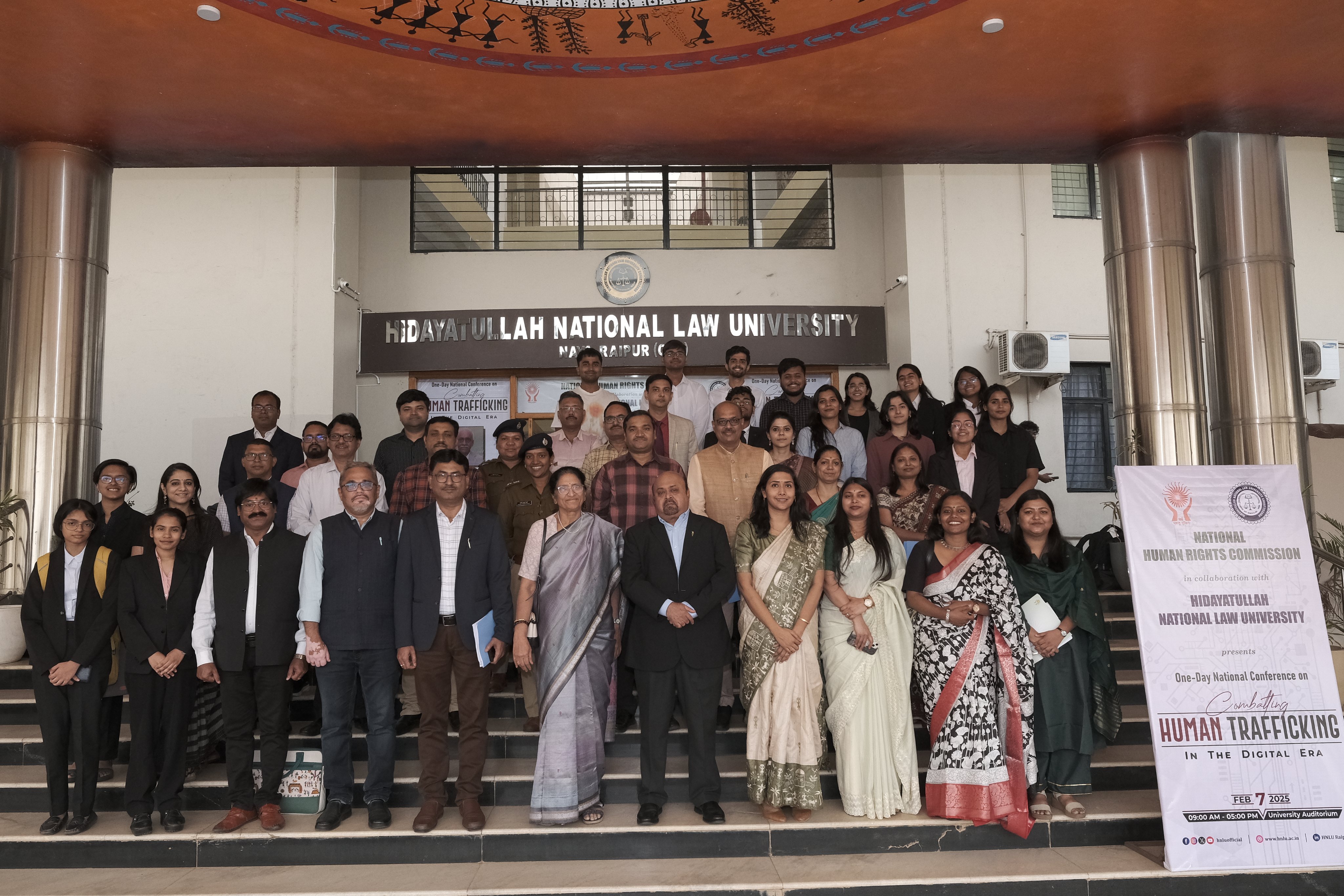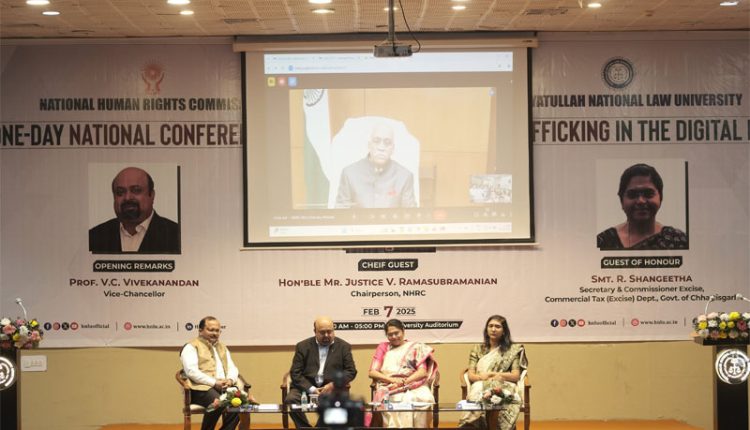NHRC, India in collaboration with the HNLU, Raipur organised a National conference on combating human trafficking in the digital era
- In his inaugural address, NHRC, India Chairperson, Justice Shri V Ramasubramanian emphasised the need for building awareness among people about the pitfalls while engaging with digital spaces to ensure their safety
- Highlighted strengthening of the regulatory and institutional frameworks as well as technological solutions to check effectively the misuse of digital space
- Among various suggestions, the conference stressed on amending the ITP Act to provide clearer distinctions between child and adult trafficking with specific provisions to include cyber trafficking within its scope
- Formal linkage between the ITPA and the IT Act also stressed filling existing legal gaps and addressing trafficking in the digital realm
New Delhi : Justice Shri V Ramasubramanian, Chairperson, National Human Rights Commission (NHRC), India inaugurated a day-long National Conference on ‘Combating human trafficking in the digital era’ organised on 7th Februray, 2025 by the Commission in collaboration with the Hidayatullah National Law University(HNLU), Raipur, Chhattisgarh. With digital technologies increasingly being exploited for human trafficking, this conference examined the role of the internet, social media, cryptocurrency, and various online tools in facilitating trafficking crimes and the role of technology, law enforcement agencies, and the community in preventing them.
Addressing virtually, the experts, law enforcement officials, academicians, and activists gathered to deliberate upon the growing menace of cyber-enabled trafficking, Justice Ramasubramanian highlighted various forms of digital trafficking such as sexual exploitation, labour exploitation, organ trafficking, and forced marriage. He also highlighted “Active Recruitment,” known as Hook Fishing, and “Passive Recruitment,” known as Net Fishing using digital technology to lure in gullible people.
The NHRC, India Chairperson emphasised the need for building awareness among people about the pitfalls while engaging with digital spaces to ensure their safety besides strengthening the regulatory and institutional frameworks as well as technological solutions to check effectively the misuse of digital space.

The conference was divided into two thematic sessions. The first session focused on the role of the Internet in facilitating human trafficking and migrant smuggling: A legal, administrative, and regulatory perspective’. It was chaired by Smt Bhamathi Balasubramanian, IAS (Retd.), co-chaired by Dr Sanjeev Shukla, Inspector General of Police, Bilaspur. Other resource persons included Dr K.V.K. Santhy, Professor of Law, NALSAR Hyderabad; Shri Kirtan Rathore, Additional SP, Raipur; and Smt Pratibha Tiwari, Additional SP, Mahasamund.
The session provided a comprehensive discussion on the various factors contributing to human trafficking, with a strong emphasis on its gendered dimensions and the growing role of digital anonymity in facilitating such crimes. A significant portion of the discussion focused on the issue of migrant smuggling in different parts of India, particularly examining recruitment strategies, coordination networks, and the smuggling of victims.
Experts highlighted trafficking cases from Chhattisgarh, shedding light on the persistent problem of non-reporting and the critical role played by Anti-Human Trafficking Units (AHTUs) in addressing these challenges. The session also explored the regulatory mechanisms in place to combat trafficking, emphasizing the need for capacity building and the development of a Standard Operating Procedure (SOP) tailored to the digital era. Additionally, the speakers underscored the role of the internet, artificial intelligence, and digital forensics in tracking and preventing trafficking cases, particularly those involving social media and missing children.
The second session was focused on the theme “Preventive Strategies against Human Trafficking: Role of Technology, Law Enforcement Agencies, Victim Support, and Community Engagement.” It was chaired by Dr Manish Mishra, Joint Director, Chhattisgarh Human Rights Commission, and co-chaired by Dr Purushotam Chandrakar, Member, Child Welfare Committee (Raipur). The panellists also included Ms Pallabi Ghosh, Founder & Director, Impact and Dialogue Foundation (Kolkata); Ms Chetna Desai; Shri Ritesh Kumar, Child Protection Officer, UNICEF, Chhattisgarh; and Prof. (Dr) Vishnu Konoorayar, Professor of Law, HNLU.
Shri Joginder Singh, Registrar (Law), NHRC, India in his concluding remarks said that combating human trafficking is a global effort requiring collaboration between governments, NGOs, technology companies, and individuals.

The conference brought forward several key suggestions to address the growing challenge of human trafficking some of which are as follows:
- Amend The Immoral Traffic (Prevention) Act (ITPA) to provide clearer distinctions between child and adult trafficking, with specific provisions to include cyber trafficking within its scope;
- Formal linkage is needed between the ITPA and the IT Act to fill existing legal gaps and address trafficking in the digital realm;
- Increase awareness regarding self-reporting portals such as the Centralized Complaint and Prevention of Women and Children (CCPWC), which could serve as an effective tool for public participation in reporting trafficking cases;
- Equip and train Anti-Human Trafficking Units (AHTUs) to combat trafficking in the digital era;
- Authentic data on human trafficking needs to be systematically collected across different categories to better inform policies and interventions;
- There is a need for community engagement as a critical component in combating trafficking in all its forms by encouraging local communities to take an active role in preventing and reporting such crimes.

